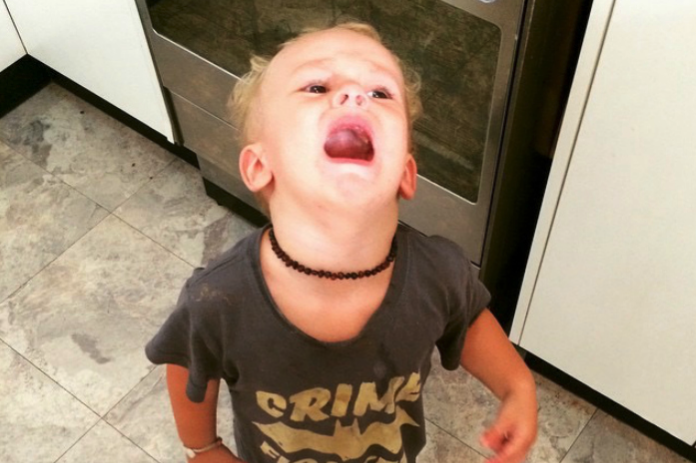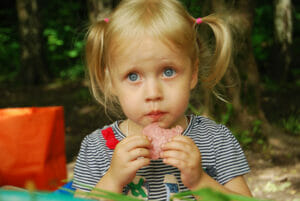![]()
Public meltdowns to parent worry

How to know when a child’s emotions are common or concerning
By Clinical Psychologist Lynn Jenkins
On those good days, when you’ve smashed the school drop-off, got a few loads on the line and put boundaries around screen time, you feel like you’ve got parenting under control, right?
You’ve whipped up some (mostly) balanced meals, managed to keep things cool at bedtime and even found a moment just for yourself to have a little breather. You’re an insta-worthy parent – tick.
So, why is it that when you find yourself mid-grocery shop, your child decides to crack it, throw a tantrum and end up in a heap on the chocky aisle floor? You feel completely out of your depth and want to scream…what the hell is wrong with you?!

You’ve probably heard it a thousand times, but please hear me when I say it again…
You’re not alone.
Even though you might feel it (something shocking) when you’re in those moments.
As a Clinical Psychologist, I meet mums, dads, and carers every week, coming to me with the same experiences. How do I manage a meltdown? What can I do to support my child’s mental health? My kid is painfully shy or looking for some tips to manage those random erratic moments.
Navigating the emotional and behavioural challenges of a child’s development is hard.
All the careful guidance and parenting wins seem to dissipate when those so-called “problem” behaviours arise. Think tantrums, big emotions, overly anxious behaviour and the really tough stuff like biting, hitting and defiance.

When you’re in a public place and get a chance to be an onlooker, thinking, wow, that sucks to be you, it’s important to remember that most parents, just like you, are doing their best.
We’re time-poor and exhausted, and some of us might need to be reminded of a few key bits of information that might help us carry our kids through their toughest emotions and biggest behaviours.
Let’s talk about science and ‘normal’ behaviour (no such thing, by the way).

If we take a look at science, it paints an interesting picture.
There’s a huge mix of complex factors that influence a child’s emotions and behaviours as they develop. Things like family circumstances, temperament, culture, health, education, and sleep all shape how a child interprets and interacts with the world.
It’s been shown that almost every child has difficulty managing their big emotions and behaviours at certain times. For most families, temper tantrums are a phrase they’ll grow out of it rings true. As children develop, most challenging behaviours and heightened emotions fall by the wayside. But where does that leave parents struggling to navigate the space between ‘normal’ developmental challenges and more serious emotional or behavioural issues?
Tips around tantrums and tapping into your mountain-ness.

I say to parents again and again (and I hope you’re listening too) – it’s important for you as a parent to remind yourself that most kids will have strong emotions like anxiety and stress. Or will show changes in behaviour when things are a bit off, such as when they’re tired, sick or going
through a rough patch, like during family stress.
As difficult as it can be for parents, tantrums, acting out and anxiety come with the territory. Having an image that reminds you to shift gears can be useful. We need to go down in gears to make the car slow down. That is, our car slows down. We need to de-escalate, not escalate, during these moments. If this makes sense to you, opt for an image of a car significantly slowing down and ensure you take some deep breaths. My personal favourite is seeing my kid as a little iceberg because I know their carry-on in front of me is an expression of something that is going on for them under the surface.
Any calm-down tool that we might use with our kids applies to us too.
In the emotional regulation program, Boss Brain, that I run with kids and parents, there are multiple ways to calm down. Still, my favourite self-control tool for parents is one that taps into my ‘mountain-ness’ – simply thinking of myself as a strong, dignified mountain standing firmly on the ground, enduring a mammoth storm. No matter how big the storm, it doesn’t change the mountain and passes.

Tapping into our mountain-ness or something similar puts us in the best nervous system position to deal with the emotional tornado. For some kids, challenges with strong emotions or big behaviours in early childhood can signify something more serious is happening beneath the surface. If your child’s behaviour or strong emotions are causing concern and other contextual factors have been taken into account, it might be time to seek help.
Let’s take a look first at what is considered the more common challenges.
Common emotional and behavioural challenges that kids face include:
- Strong, sudden changes in emotions or behaviour
- Strong levels of anxiety when the time comes to separate from other family members
- Being withdrawn, worried, anxious or upset
- Difficulty managing moments of anger or frustration
- Regular tantrums or aggressive behaviour
- Difficulty paying attention, following instructions or staying on task
When and where to seek help.

When Child Psychologists and other health professionals work with parents and young children, they look at problematic behaviours or emotions through the lens of ‘Early Intervention’. By identifying challenging emotions and behaviours in children and providing the right kind of care from an early age, kids are more likely to be supported and nurtured in cases where they may have been on track to have poorer developmental outcomes.
It’s a daunting path to go down. Even the language feels scary: ‘deficit’, ‘outcomes’ and ‘risk factors’ aren’t the kind of things parents want to keep score of as their kids grow up. That said, there are general criteria used by pediatricians, GPs and Psychs that determine if a child may need some additional support and behavioural assessments, and it’s important to be aware.
As mentioned, parents might initially observe that their child has more extreme or complex emotions and behaviours compared to other kids of a similar age. Other criteria might be:
- Ongoing big behaviours, such as tantrums and outbursts, occurring over several weeks or months.
- A child’s behaviour or mood is not improved, despite parents intervening with support and guidance.
- Other aspects of a child’s life, such as socializing or learning, are also impacted.
- The strong emotions or behaviours happen in different settings, such as home, school, or in playgroups.
Kids are great observers but terrible interpreters.
It’s important to understand that kids experience their world in accordance with the culmination of their genetics, health, social experiences and level of development. These factors shape the input that is constantly going into their nervous system. The way their world is interpreted by their thinking and body really sets the wheels in motion when it comes to their big emotions and the expression of their feelings (aka, their big behaviours or tantrums).
Something I say A LOT is: that kids are great observers but terrible interpreters. The way they interpret is absolutely and totally shaped by their very junior level of child development. It most likely won’t make sense to us as parents by the very fact that they are acting out tells us that their nervous system is receiving the message that they are very uncomfortable.
Focusing on this fact helps us remember that the main thing we want to focus on as parents is to help their nervous system back to calm instead of taking their behaviour personally.
THIS IS SO HARD, THOUGH!
So, even if you attempt to handle those big moments with this approach, take it as a win! It is a stepping stone, and they will notice the attempt. Lastly, remember: you are not alone, you usually have good intentions, and you are an adult, so it is legal to drink alcohol!
For more Printable Quick Tips for Tantrums and for Managing, Meltdowns Click Here
See more of Lynn’s Articles here
The Healthy Mummy Wellness App – Practical Wellbeing For Your Daily Life

The Healthy Mummy Wellness app is built to support mums’ mental, physical and social wellbeing. We have expert advice to help mums makeover their minds, transform their mood, manage their hormones, sleep better and engage with their family. You can listen to podcasts, read blogs, work out with our trainers and find healthy, family-friendly recipes from the palm of your hand.Get the Healthy Mummy Wellness App here



